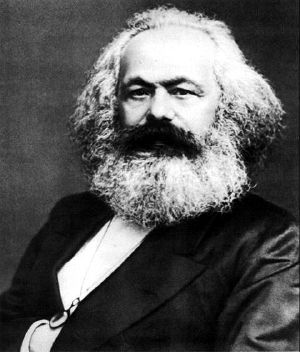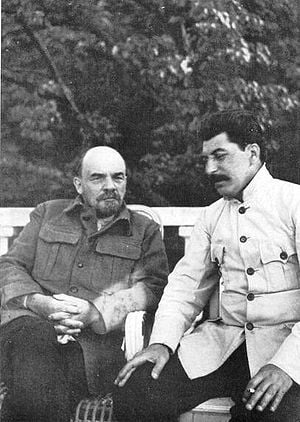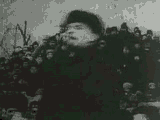What did Lenin add to Marxs Communist theory after the working class revolution?

Stalin, Lenin, and Trotsky in 1919.
Marxism-Leninism is an adaptation of Marxism developed by Vladimir Lenin, which led to the first successful communist revolution in Lenin's Russia in November 1917. Every bit such, it formed the ideological foundation for the globe communist movement centering on the Soviet Union. In the twentieth century, all nations calling themselves communist and communist parties in other nations were founded on Marxist-Leninist principles. The core ideological features of Marxism-Leninism include the belief that a revolutionary proletarian class would not emerge automatically from capitalism. Instead, there was the need for a professional revolutionary vanguard political party to atomic number 82 the working class in the violent overthrow of capitalism, to be followed by a dictatorship of the proletariat equally the first stage of moving toward communism. Marxism-Leninism also maintained that workers in the most advanced capitalist countries had non opted for revolution because commercialism had moved to a new phase through the exportation of capital to colonies, which allowed capitalists to exploit such colonies and enrich markets and "bribe" workers in developed countries with higher wages. Marxism-Leninism, therefore, saw the developing world every bit the frontline in the struggle against imperialism. Equally those markets were cut off through national liberation, capitalism would implode in the developed world and communist revolution would occur in that location likewise.
Communist parties subscribed to the teachings and legacy of Karl Marx and Frederick Engels (Marxism), equally interpreted by of Lenin. The term Marxism-Leninism was most often used by the Soviet Union and its supporters who held that Lenin's legacy was successfully advanced by Joseph Stalin, although Trotskyists and Maoists are besides technically Marxist-Leninists. The term was also used by Soviet Communists who repudiated Stalin, such as the supporters of Nikita Khrushchev. Gimmicky Marxist-Leninist regimes today include Vietnam, Laos, and Fidel Castro's Cuba. China and Democratic people's republic of korea have each sought to distance themselves somewhat from Marxism-Leninism simply have not repudiated the bones principles of the Communist revolutions that created these governments.
History of the term


Although Lenin himself never used the term "Leninism," his interpretation of Marx's teaching became the impetus for the founding of the Soviet Spousal relationship and the numerous Marxist-Leninist parties inspired by the Russian Revolution. Lenin'south ideas diverged from classical Marxist theory on several of import points (encounter Marxism). Bolshevik communists—the followers of Lenin—saw these differences as advancements of Marxism rather than a deviation from information technology. According to Lenin, these changes were fabricated necessary by the appearance of Imperialism, which enabled backer nations to export appurtenances to colonies and profit both from the auction of such goods and from the financing of the purchase of such goods with high interest loans. A small portion of the profits that resulted from such practices were passed on to industrial workers to foreclose them from attaining the revolutionary consciousness which Marx had predicted would emerge. Because of this, Lenin taught, the offset Communist revolution would not necessarily occur in industrialized Europe as Marx said it would, but in that nation in which a disciplined "vanguard" would seize power and create the "proletarian dictatorship."
| " | We need the existent, nation-wide terror which reinvigorates the country and through which the Swell French Revolution achieved glory.[1] | " |
After Lenin's death, his ideology and contributions to Marxist theory were termed "Marxism-Leninism," or sometimes only "Leninism." Marxism-Leninism soon became the official name for the ideology of the Comintern and of communist parties around the globe. To a big extent, the adaptations that Lenin made to Marxism provided a framework for communist activity in revolutionary movements throughout the world. Marxism-Leninism, dissimilar Marxism per se, took a far more practical approach to the attainment of political ability. Its focus was the achievement of ability rather than ideology. It, therefore, saw the need to train revolutionary cadres. Information technology recognized that an opportune seizure should not be dismissed just because the ideal textbooks weather described by Marx were lacking. It portrayed Imperialism rather than Capitalism as the enemy and it emphasized the need for a disciplined communist party rather than a "big tent" approach as crucial for advancing the Communist cause. It maintained that Communism could exist established during the period of evolution of mainstream communism. Like Lenin, Stalin'south approach to communism was a highly practical, although brutal one. Lenin negotiated a rapid retreat of Russian forces from World War I and Stalin opted for "socialism in 1 nation" equally beingness important than attempting to export the Soviet revolution to other parts of the world and create enemies at a time when the USSR was not politically and economically prepared to confront such enemies. Understandably, Trotskyists who favored export of the Soviet revolution believed that that Stalinism contradicted authentic Marxism and Leninism, and they initially used the term "Bolshevik-Leninism" to depict their own ideology of anti-Stalinist and anti-Maoist Communism.
After the Sino-Soviet split in 1960, the Soviet Union and the People's Republic of China each claimed to be the truthful intellectual heir to Marxism-Leninism and the Chinese were especially critical of post-Stalin leadership in the USSR, commencement with Nikita Khrushchev. In People's republic of china, the claim that Mao had "adapted Marxism-Leninism to Chinese conditions" evolved into the idea that he had updated it in a fundamental style applying it to the earth equally a whole. Consequently, the term "Marxism-Leninism-Mao Zedong Thought" (normally known every bit Maoism) was increasingly used past the Chinese to depict the official country ideology and this likewise served every bit the ideological footing of parties around the world who sympathized with the Communist Political party of China. Following the decease of Mao, American Maoists associated with the Revolutionary Communist Party (Us) coined the term Marxism-Leninism-Maoism, arguing that Maoism was a more than advanced stage of Marxism.

In Northward Korea, Marxism-Leninism was officially superseded in 1977 by Juche (self-reliance), in which concepts of class and class struggle, in other words Marxism itself, no longer play a pregnant function due in role to all remnants of Capitalism and private ownership having been eradicated. However, the government is nonetheless sometimes referred to as Marxist-Leninist—or, even Stalinist—due to the nature of its political and economical structure.
The other iii communist states existing today—Republic of cuba, Vietnam, and Laos—however concord Marxism-Leninism every bit their official ideology, although they requite it unlike interpretations in terms of practical policy.
Distinction from classical Marxism
The most crucial deviation between "classical" Marxism and Marxism-Leninism has to practice with the fact that the early on twentieth century working class had not developed in the style that Marx and Engels had predicted, but was adopting "bourgeois" values instead of supporting the communist crusade. In accordance with Marx'southward Laws of Economic Movement, the working class was supposed to develop a sense of form solidarity and a revolutionary consciousness due to increasing poverty considering of machines replacing workers. As per the per the Marxist axiom that only labor produces profit, these circumstances would also result in a decrease in profits, resulting in a concentration of upper-case letter where less and less businesses would survive and then the Backer enemy would go increasingly targeted and a focus of antagonism. According to Marx'south theories, these atmospheric condition would foster an overwhelming revolutionary sentiment. The ruling class, however, would only repress this democratic urge toward socialism, resulting eventually in a reaction that would lead to tearing revolution. A "dictatorship of the proletariat" would be imposed by the workers themselves and would atomic number 82 club in the transition from [[Socialism] to Communism.
Lenin perceived that the workers in the industrialized nations were not developing the revolutionary consciousness that Marx foresaw. In Imperialism, the Highest Stage of Capitalism (1916), he theorized that the imperialist powers had temporarily circumvented the process Marx envisioned, by exporting majuscule and products to their colonies and, in turn, challenge the wealth and raw materials of these colonies. The result was that the Capitalists could afford to provide their workers with just enough benefits to keep them satisfied and postpone any revolutionary ambition. As a issue, Lenin insisted that merely a "vanguard party" of the proletariat, comprised primarily of intellectuals rather than the workers, needed to foster the necessary revolutionary consciousness to overthrow the Capitalists. Lenin likewise advocating extending the target population for such revolutionary fervor to include peasants and the Russian soldiers involved in a seemingly hopeless war in Europe. In order to exercise this, they would demand to use any means necessary to seize power and institute the proletarian dictatorship. Afterwards the Russian Revolution, Lenin saw that "reactionary forces" were then ingrained in Russian order that he maintained that a "Ruddy Terror" would demand to be organized by the Bolshevik state in gild to root out such counter-revolutionary institutions as the "bourgeois press" and religious "superstition."

| " | To tolerate the conservative newspapers would hateful to cease being a Socialist. When i makes a Revolution, one cannot marker time; i must always get forward-or go back. He who now talks about the 'freedom of the Press' goes backward, and halts our headlong course toward Socialism.—V.I Lenin [2] | " |
This version of Marx's the "dictatorship of the proletariat"—in which a small Communist political party, backed past ruthless law ability, determined what was proficient for the workers whether they liked it or not resulted when Lenin failed to proceeds a majority of parliamentary support following the Bolshevik Revolution. Every bit the forces of "bourgeois democracy," religion, and other counter-revolutionary movements remained obstacles, Stalin would prolong the dictatorship of the proletariat, justifying the totalitarian regime of the Soviet Union because of the danger of reactionary efforts to suppress the revolution. Although subsequently leaders, notably Khrushchev, attempted to speculate on when such dictatorship might cease their target dates came and gone and the stage from socialism to Communism was extended through an intermittent catamenia referred to in the final years of the Soviet Wedlock as "developed socialism."
Marxism-Leninism in the Soviet Wedlock
Marxism-Leninism in the Soviet Wedlock was a selected mix of the prolific writings of Marx and Lenin, in improver to inclusions fabricated by Soviet political government. Marxism-Leninism was both the official credo of the Soviet Wedlock, and the nigh influential strain of Marxism.
Marxist-Leninist practices changed slightly with each successive era of Soviet Communist Party leaders. Khrushchev strongly opposed the establishment of personality cults like that of the Stalin era, which it described as conflicting to Leninism. Leonid Brezhnev oversaw a period in Soviet history where the dissent fostered by Khrushchev was once again discouraged. It is largely accepted that Marxism-Leninism ended in the Soviet Union with the openness of criticism and rejection of bones tenets of the ideology during Gorbachev's policies of Perestroika and Glasnost (Brown 2004).
Current usage

Most Communist parties today proceed to regard Marxism-Leninism every bit their basic ideology, although many have modified it to adapt to new political conditions. All the same, several parties, especially those previously associated with Eurocommunism, have distanced themselves from Leninism and in many cases omitted it from their official documents. Some have started identifying themselves as "Marxist and Leninist" rather than "Marxist-Leninist."
In party names, the appellation "Marxist-Leninist" is normally used by a Communist party who wishes to distinguish itself from some other (and presumably 'revisionist') communist party in the same land. Near oft, parties who place the term "Marxist-Leninist" in their official name are those originating from the anti-revisionist tradition, such every bit Maoist groups.
See as well
- Marxism
- Communism
- Socialism
- Vladimir Lenin
- Stalin
- Karl Marx
- Soviet Union
Notes
- ↑ Lenin quotes thinkexist.com. Retrieved Nov 21, 2007.
- ↑ Ten Days That Shook the World en.wikisource.org. Retrieved November 21, 2007.
References
ISBN links support NWE through referral fees
- Brown, Archie. The Demise of Marxism-Leninism in Russia. Basingstoke, Hampshire: Palgrave Macmillan, 2004. ISBN 9780333651247
- Brzezinski, Zbigniew. Credo and Ability in Soviet Politics. New York: Praeger, 1962. OCLC 504448
- Crossman, R. H. Due south., and Arthur Koestler. The God That Failed. New York: Harper, 1950. OCLC 265859
- Evans, Alfred B. Soviet Marxism-Leninism The Turn down of an Ideology. Westport, CT: Praeger, 1993. ISBN 9780275947637
- Lenin, Vladimir Ilʹich. Imperialism, the Highest Stage of Capitalism: A Popular Outline. Peking: Foreign Languages Press, 1965. OCLC 4316462
- Luxemburg, Rosa. The Russian Revolution, and Leninism or Marxism? Ann Arbor: Academy of Michigan Press, 1961. OCLC 406891
- Michael, Franz H. Prc and the Crunch of Marxism-Leninism. Boulder, CO: Westview Printing, 1990. ISBN 9780813379111
- Serge, Victor. From Lenin to Stalin. New York: Monad Printing; distributed by Pathfinder Press, 1973. OCLC 621858
Credits
New World Encyclopedia writers and editors rewrote and completed the Wikipedia article in accordance with New Globe Encyclopedia standards. This article abides by terms of the Creative Commons CC-past-sa iii.0 License (CC-past-sa), which may be used and disseminated with proper attribution. Credit is due nether the terms of this license that can reference both the New World Encyclopedia contributors and the selfless volunteer contributors of the Wikimedia Foundation. To cite this article click here for a list of acceptable citing formats.The history of earlier contributions past wikipedians is accessible to researchers here:
- Marxism-Leninism history
The history of this article since it was imported to New World Encyclopedia:
- History of "Marxism-Leninism"
Note: Some restrictions may apply to utilise of private images which are separately licensed.
Source: https://www.newworldencyclopedia.org/entry/Marxism-Leninism
0 Response to "What did Lenin add to Marxs Communist theory after the working class revolution?"
Post a Comment